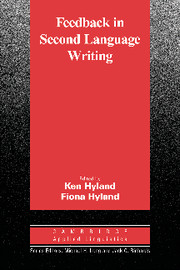Book contents
- Frontmatter
- Contents
- Contributors
- Series editors' preface
- Preface
- Chapter 1 Contexts and issues in feedback on L2 writing: An introduction
- I SITUATING FEEDBACK: SOCIOCULTURAL DIMENSIONS
- II SHAPING FEEDBACK: DELIVERY AND FOCUS DIMENSIONS
- Chapter 5 Does error feedback help student writers? New evidence on the short- and long-term effects of written error correction
- Chapter 6 Electronic feedback and second language writing
- Chapter 7 Resource-rich Web-based feedback: Helping learners become independent writers
- Chapter 8 Feedback in portfolio-based writing courses
- Chapter 9 Students and research: Reflective feedback for I-Search papers
- III NEGOTIATING FEEDBACK: INTERPERSONAL AND INTERACTIONAL DIMENSIONS
- Author index
- Subject index
Chapter 9 - Students and research: Reflective feedback for I-Search papers
Published online by Cambridge University Press: 05 October 2012
- Frontmatter
- Contents
- Contributors
- Series editors' preface
- Preface
- Chapter 1 Contexts and issues in feedback on L2 writing: An introduction
- I SITUATING FEEDBACK: SOCIOCULTURAL DIMENSIONS
- II SHAPING FEEDBACK: DELIVERY AND FOCUS DIMENSIONS
- Chapter 5 Does error feedback help student writers? New evidence on the short- and long-term effects of written error correction
- Chapter 6 Electronic feedback and second language writing
- Chapter 7 Resource-rich Web-based feedback: Helping learners become independent writers
- Chapter 8 Feedback in portfolio-based writing courses
- Chapter 9 Students and research: Reflective feedback for I-Search papers
- III NEGOTIATING FEEDBACK: INTERPERSONAL AND INTERACTIONAL DIMENSIONS
- Author index
- Subject index
Summary
Teacher intervention in students' writing processes and peer and instructor feedback, often combined with student self-evaluation and reflection, have been central to the teaching and learning of writing for many years. Beginning with the Writing Process Movement in the 1970s, teachers have intervened while assisting students to develop more expert writing processes (Silva, 1990). Studies of expert processing indicated that “writing is not a straightforward plan-outline-write process” (Taylor, 1981). Instead, it is a “complex, recursive, and creative process or set of behaviors.…” (Silva, 1990, pp. 15–16). Encouraged by textbooks and this research, instructors scaffolded student work, providing intervention and feedback activities as students attempted to acquire the necessarily “complex, recursive … sets of behaviors.” And as students prepared their texts, instructors offered opportunities to develop meta-awareness and autonomy by reflecting on their writing processes.
More recently, genre theorists and practitioners have shown how text structure and content, context, audience, writer purposes, and writer and discourse community ideologies influence the processing of written texts among expert writers. In this paradigm, writers need a sophisticated meta-knowledge of a variety of contextual and personal factors as they plan and execute their drafts and revisions, working toward a successful written product (Bawarshi, 2003; Hyland, 2002; Johns, 1997). Thus, teacher intervention, teacher and peer feedback, and student reflection should become even more important to novice writers as they develop increasing awareness of the need to balance their purposes, processes, target genre, audience, and context.
- Type
- Chapter
- Information
- Feedback in Second Language WritingContexts and Issues, pp. 162 - 182Publisher: Cambridge University PressPrint publication year: 2006
- 1
- Cited by



